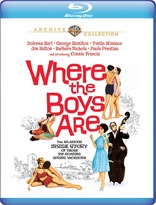Where the Boys Are Blu-ray Movie
HomeWhere the Boys Are Blu-ray Movie 
Warner Archive CollectionWarner Bros. | 1960 | 99 min | Not rated | Jul 25, 2017
Movie rating
6.6 | / 10 |
Blu-ray rating
| Users | 4.0 | |
| Reviewer | 3.5 | |
| Overall | 3.5 |
Overview
Where the Boys Are (1960)
Four very different college women drive to Fort Lauderdale, Florida for spring break to find adventure and romance.
Starring: Dolores Hart, George Hamilton, Yvette Mimieux, Paula Prentiss, Jim Hutton (I)Director: Henry Levin
| Drama | Uncertain |
| Comedy | Uncertain |
| Romance | Uncertain |
Specifications
Video
Video codec: MPEG-4 AVC
Video resolution: 1080p
Aspect ratio: 2.40:1
Original aspect ratio: 2.35:1
Audio
English: DTS-HD Master Audio 2.0 Mono (48kHz, 24-bit)
Subtitles
English SDH
Discs
Blu-ray Disc
Single disc (1 BD)
Playback
Region A (B, C untested)
Review
Rating summary
| Movie | 3.0 | |
| Video | 4.5 | |
| Audio | 4.0 | |
| Extras | 3.0 | |
| Overall | 3.5 |
Where the Boys Are Blu-ray Movie Review
A long time ago on a sunny beach far, far away . . .
Reviewed by Michael Reuben July 27, 2017Where the Boys Are appeared in 1960, the same year as the setting for the opening season of
TV's Mad Men, and both are time capsules of
the manners and mores of a bygone era. The
difference is that Mad Men reinvented that time with an often ironic awareness of what would
follow it, whereas Boys represents its age without detachment. Adapted from a popular novel by
Glendon Swarthout (who also wrote The Shootist), the film was
billed
as a teen comedy, one of
the first, and it helped spawn an entire sub-genre of beach-themed entertainments, including the
Beach Party series starring Frankie Avalon and Annette Funicello.
But Boys had something more serious on its mind, which is why it plays today as an uneasy
mixture of broad farce and romantic melodrama. In an era when the Hays Code still strait-jacketed filmmakers from dealing honestly with sexual
relations, Boys used humor and
euphemism to bypass screen taboos. If much of the film's creative circumlocution seems quaint
today, it's largely because Boys anatomizes a template of morality that, within just a few years,
would be shredded by the sexual revolution of the Sixties. It's worth noting that the film's year of
release was also the first year that birth control pills became widely available, thereby
transforming the female sexual calculus on which Boys' plot largely depends.
The Warner Archive Collection has remastered Boys for Blu-ray with a new transfer that
showcases director Henry Levin's (Journey
to the Center of the Earth) widescreen compositions
and location photography. With its (now) politically incorrect depictions of "good" girls vs.
"bad", the film is a fascinating museum piece, enlivened by lead performances that include the
screen debuts of singer Connie Francis and newcomer Paula Prentiss, who would go on to
become a familiar figure in both film and TV, equally famous for her talents as a comedienne and
her durable marriage to actor/director (and sometime co-star) Richard Benjamin.
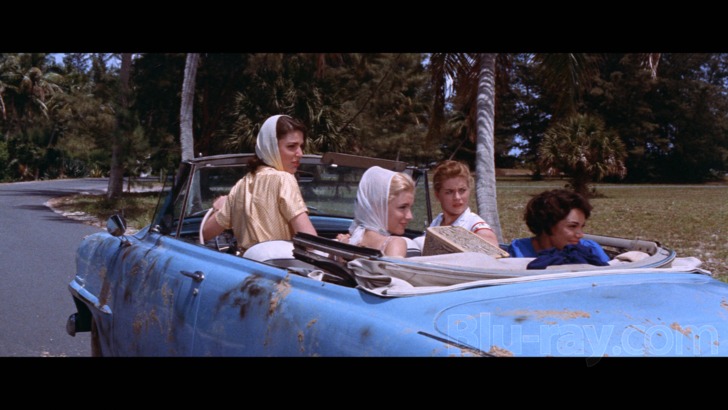
Boys traces the adventures of four freshman women who depart their snowy campus up north for spring break on the Florida beaches of Ft. Lauderdale, because that's "where the boys are". Over the course of a frenetic week, the foursome experience adventures that are sometimes comic, sometimes romantic and sometimes traumatic. Meanwhile, the population of their cut-rate motel room expands every night, as they continue to take in penniless students and strays.
The film establishes its relationship issues in an early classroom scene where Merritt Andrews (Dolores Hart) offers an impromptu class presentation on premarital sex—or, in the carefully chosen word of Boys' script, "emotional involvement" and "playing house". Merritt scandalizes her teacher, whose ironic name is Dr. Raunch (Amy Douglass), and thrills the entire class by acknowledging what all of them already know, which is that girls are now expected to indulge their boyfriends' desires and those who withhold their favors quickly become unpopular. Still, when Merritt and her friends reach Florida, she struggles to remain a "good girl", and the story rewards her with the catch of the season in the person of Ryder Smith (George Hamilton), a Princetonian heir who sweeps Merritt off her feet, but not into bed, with his good looks and charm—not to mention his yacht, mansion and butler. Merritt's friend, Melanie Tolman (Yvette Mimieux), takes the opposite approach, throwing herself into the holiday spirit, drinking to the point of collapse and dating a revolving door of Ivy Leaguers (or so they say) with whom, we are meant to infer, she shares a different bed every night. Where Merritt is rewarded for being "good", Melanie is ultimately punished for being "bad", and the film treats her punishment as unfortunate but deserved. (If you can't take date rape in stride, Boys isn't the film for you.)
The group's other two members endure more comfortingly comic romantic entanglements. Angie (Connie Francis) finds herself attached to an eccentric musician named Basil (Frank Gorshin), whose band plays "dialectic jazz" and who doesn't begin to notice the diminutive co-ed until she opens her mouth to sing and the voice of Connie Francis emerges. (Producer Joe Pasternak actively recruited the singer for the role, even though she was more interested in continuing her successful recording and touring career.) The exceptionally tall Tuggle Carpenter (Paula Prentiss) is paired with an even taller admirer whose name is equally unlikely: "TV" Thompson (Jim Hutton), so dubbed because he aspires to work in television, which may explain why he delivers every sentence as if he were speaking into a microphone. "TV" routinely bemoans his lack of success with women, but Tuggle sees in him a candidate to help her achieve her life's ambition, which is to become a married "baby-making machine". (One wonders why she's bothering with college.) The budding relationship hits a snag when Tuggle refuses to sleep with "TV"—it's one of the film's most overt sexual negotiations—and the disappointed suitor finds his attention straying to a big-chested platinum blonde nightclub performer with the appropriately seductive name of Lola Fandango (Barbara Nichols, a/k/a "Queen of the B Movies").
Boys maintains a light-hearted tone throughout most of its running time, effectively exemplified by Ft. Lauderdale's beleaguered police captain (Chill Wills), who warns his officers to "expect anything" and to maintain a sense of humor "'cause you're gonna need it if you want to survive!" Routine police broadcasts dispatching law enforcement to the latest scene of student excess provide a humorous narration, much like the loudspeaker announcements in M.A.S.H. "TV's" brief dalliance with the pneumatic Ms. Fandango results in a slapstick disaster that lands most of the group in police custody, from which Lola extricates them with a classic dumb blonde plea. But then, in its final twenty minutes, Boys turns deadly serious—and it also reveals the prudish underpinnings of the sexual teases that have been propelling the film. As it turns out, talking about sex is a perfectly safe pursuit for an educated young woman in the world of Boys, but actually doing it places her in mortal peril. Indeed, Boys appears to endorse the view that "bad" girls who let men take liberties forfeit both their dignity and the right to say no. It's a jarring turn in a film that bills itself as a frothy romantic comedy, and the fact that no one in 1960 seems to have noticed the dissonance says as much about the era as the script's squeaky clean language and chaste onscreen kisses. When it's not busy clowning around, Boys plays less like an entertainment and more like an artifact of an ancient civilization. It belongs in the Smithsonian.
Where the Boys Are Blu-ray Movie, Video Quality 
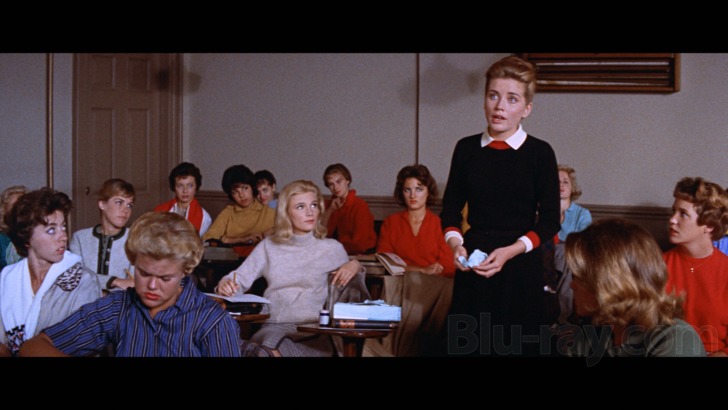
Where the Boys Are was shot in Cinemascope by Robert J. Bronner (It's Always Fair Weather), a member of MGM's reliable cadre of cinematographers. For this 1080p, AVC-encoded Blu-ray from the Warner Archive Collection, WAC rejected an existing "temp" master prepared for broadcast and commissioned a new scan, which was performed at 2K by Warner's Motion Picture Imaging facility using a recent interpositive. After color-correction and cleanup, the result on Blu-ray is an impressive reproduction of director Henry Levin's crowded frames, some shot on location in Florida and others created in the studio, sometimes with obvious (very obvious) rear projection. Boys did not have a generous budget, and its image doesn't have the polish of MGM's A-list productions, but it ably contrasts the chilly Northern environs with the Florida sun, and its female quartet looks delightful in their various colorful (but tasteful) outfits. Some of the night scenes reflect the weak contrast typical of day-for-night photography, but that problem is inherent in the source. Sharpness and detail are appropriate for the era's Cinemascope lenses. As per its usual practice, WAC has mastered Boys with a high average bitrate, here 34.99 Mbps.
Where the Boys Are Blu-ray Movie, Audio Quality 
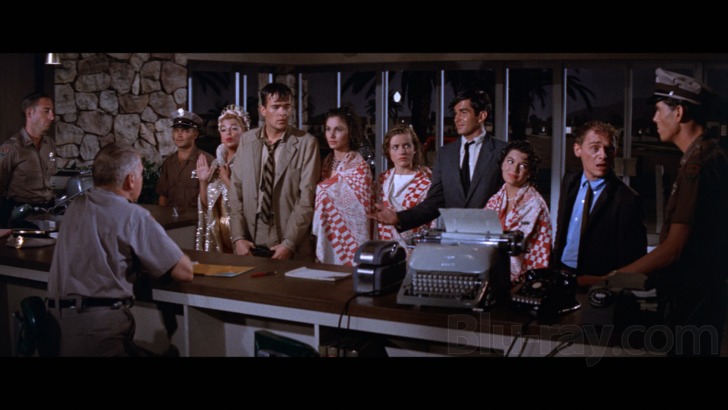
Boys original theatrical mono track has been taken from the magnetic printmaster, cleaned of any age-related flaws and deterioration, and encoded in lossless DTS-HD MA 2.0. (Although the music for Boys was recorded in stereo, MGM did not deem the film worth the expense of a final stereo mix.) The sounds of winter in the opening sequences are comically exaggerated, and that approach to the film's audio persists throughout, shading into a more realistic style only near the end (a tense scene of someone crossing a heavily trafficked road is surprisingly convincing). The dialogue is always intelligible, even when Frank Gorshin's Basil is hamming it up, and the singing voices of both Connie Francis and Barbara Nichols are rendered with clarity and fidelity. The mostly light-hearted score is credited to George Stoll (Viva Las Vegas), although the title song, which became Connie Francis' signature tune, was written (at Francis' insistence) by Neil Sedaka and Howard Greenfield.
Where the Boys Are Blu-ray Movie, Special Features and Extras 
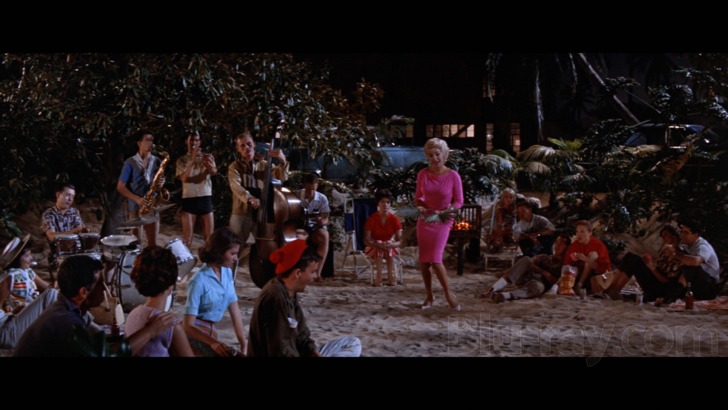
The extras have been ported over from Warner's 2004 DVD release of Where the Boys Are. The
trailer has been remastered in 1080p.
- Commentary with Paula Prentiss: Recorded in 2003, Prentiss remembers her debut feature fondly and speaks warmly of her various co-stars. Her commentary offers a first-hand account of the MGM star- and hit-making machine when it still had the capacity to take an unknown like Prentiss, with no experience in movies, and transform her into an "it" girl whom the studio would pair with her Boys co-star Jim Hutton in three more comedies.
- Where the Boys Were: A Retrospective (480i; 1.33:1; 7:54): This brief featurette consists almost entirely of interviews conducted in 2003 with Paula Prentiss and Connie Stevens, who both tell good stories.
- Ford Lauderdale Scene of the World Premiere (480i; 1.33:1; 1:13): They still shot newsreels in 1960!
- Theatrical Trailer (1080p; 2.40:1; 3:13): The trailer's animation by Jay Ward Productions matches the film's opening narration by an uncredited Paul Frees, whose mock-serious voice will be instantly familiar to any fan of the classic Rocky and Bullwinkle animations.
Where the Boys Are Blu-ray Movie, Overall Score and Recommendation 
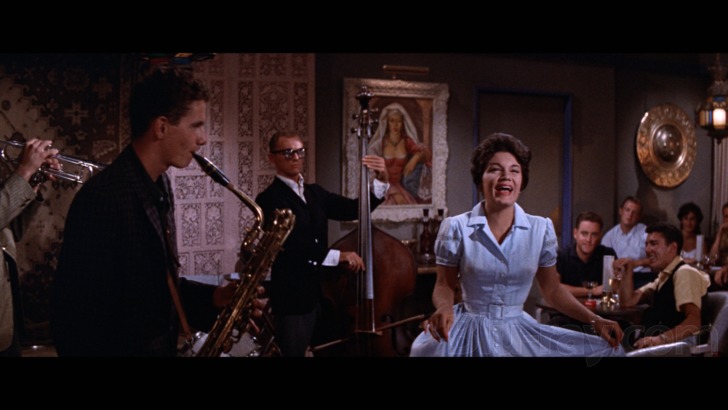
While the two events aren't connected, it seems somehow appropriate that Boys' star Dolores
Hart gave up her acting career three years after the film's release to enter the Benedictine order,
becoming the only nun who is also a voting member of the Academy of Motion Picture Arts and
Sciences. For all its rebellious surface, Where the Boys Are rests on attitudes toward sex and
marriage that even the strictest Reverend Mother could endorse. WAC has done their usual
commendable job bringing this antique to Blu-ray, but watching it requires a psychological
Wayback Machine. Buyer's choice.
Similar titles
Similar titles you might also like

One Crazy Summer
Warner Archive Collection
1986

Where the Boys Are '84
Limited Edition - 2,000 copies
1984

Summer Lovers
Limited Edition to 3000 - SOLD OUT
1982

Some Girls
1988

Blame It on Rio
1984

Spring Break
1983

The Happy Ending
1969

A Summer Place
Warner Archive Collection
1959

On Chesil Beach
2017

Rough Night
The Rougher Morning Edition
2017

The Devil and Miss Jones
1941

Gloria Bell
2018

The Shape of Things
2003

The Allnighter
1987

Baby It's You
4K Restoration
1983

Private
Fallo! / Do It!
2003

Lord Love a Duck
1966

The Four Seasons
1981

The Facts of Life
1960

Love with the Proper Stranger
1963
